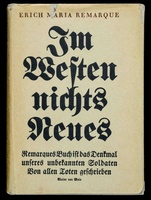Remarque: ‘All Quiet on the Western Front’
Erich Maria Remarque’s most acclaimed novel is a semiautobiographical account of soldiers’ conditions and experiences on the front lines of World War I. Centered on Paul, a vibrant, creative nineteen-year-old, the novel chronicles the war’s effects on Paul and his fellow soldiers. Remarque published the book to great acclaim in 1929, a decade after the war, with the original German title Im Westen nichts Neues, or There’s Nothing New In the West. Hailed as a masterpiece of protest literature, the German title spells out Remarque’s stance: The war produced nothing. It is no surprise, then, that the Nazi party banned and burned Remarque’s books.
Displayed in Imprints and Impressions are the first German edition (1929) and the galley proofs with Remarque’s own corrections (1928)—previously unavailable to Remarque scholars.
—Patrick Thomas, PhD, Assistant Professor, English
Ulrike Schellhammer, lecturer in global languages and cultures, discusses Erich Maria Remarque’s text and its place within antiwar expressionist art; she also explores the edits Remarque made to the galley proofs of his novel. Interview is an online supplement to the University of Dayton exhibit Imprints and Impressions: Milestones in Human Progress—Highlights from the Rose Rare Book Collection, held Sept. 29 through Nov. 9, 2014.

